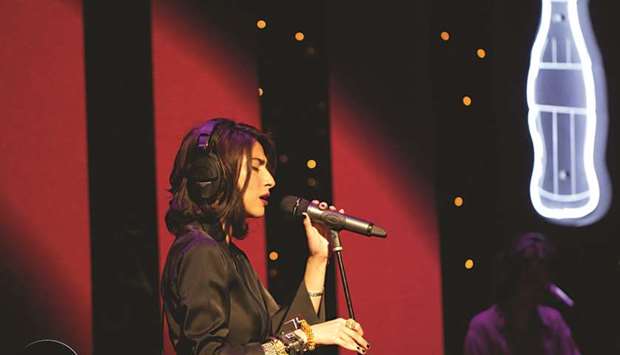Earlier this month, two songs from two different studios – Coke Studio and Velo Sound Station – were released and both created a sensation amongst the listeners, garnering millions of views in just a few hours. Both sound tracks, Na Tutteya Ve and Boom Boom feature Meesha Shafi as the lead vocalist, touching the base of two completely different genres and language.
Where Na Tutteya Ve is in Punjabi language and a female anthem, featuring six other female artistes, Boom Boom (remake of the iconic sound track by Nazia Hassan) is a club banger, the first of its kind to be released in mainstream or commercial music stream.
The past decade has been extraordinary one in the life of Meesha Shafi. Even if you have only casual knowledge of Meesha’s music – there may be hardly anyone in Pakistan who can’t sing all the words to Jugni, a Coke Studio Season 3 release in 2010. Meesha has become not only one of the most successful female recording artistes of this decade in Pakistan, but also an unrivalled power broker who has prevailed in a volatile Pakistan music industry and brought today’s music overlords to heel with her powerful female vocals.
This December, Meesha have had the number-one, number-two songs in Pakistan and a couple more released along the same timeline.
“It is sinking in. I have felt this feeling before, but this time it’s on a different scale. It gave me a reminder, a nostalgia, that I had experienced this kind of love and success before when Jugni came out. At that time, it was a kind of my mainstream debut and it feels like this beautiful starting and ending sort of punctuated my ten years in music,” Meesha said in an exclusive interview with Gulf Times.
She feels that music coming out of Pakistan has taken a turn towards experimentation over the last decade. “Listeners have changed, music has changed. As an artiste myself, I have explored a lot of different things, stylistically. The way I sing, the way I use my voice and play with different genres – making it audio-visual experience now for the last few years has come into play.”
After Jugni, having a theatre background Meesha ventured into acting with a few projects in the Pakistani drama industry and also making appearances in Hollywood and Bollywood productions. However, she didn’t pursue it later as keenly.
“I didn’t pursue because sitting in Pakistan, like 95% of the scripts that are being written just do not resonate with me. I am selective towards substance,” Meesha adds, “The script writing has gone down unfortunately. I think in our dramas they are romanticising, turning it into a badge of honour, that you’re a good woman if you are putting up with the mistreatment, abuse and injustice. I don’t agree with that and I don’t want to be a part of that narrative. I think it’s an unhealthy direction to be following.”
Since 2007, Coke Studio has rapidly become one of the most influential platforms in musical media whilst winning praise from everyone who’s familiar with it, including from fans across the border in India. However, some people from within music industry form a strong opinion that such platforms stagnate the music industry. Meesha responds, “You know the idiom ‘sour grapes’? That’s it! I think it’s a case of that. I’m not saying it in a judgmental way but very factually… that I think it’s human nature to feel resentment to things you’re not included in. Don’t view things from a bitter perspective,” she adds, “Myself included, there are lists of names of artistes these very platforms have been responsible for transforming the lives of. It’s undeniable what these platforms have done for folk and regional artistes, folk instruments that we have in our South Asian heritage that were never really used previously in mainstream music. It’s not fair to say that it’s doing nothing for the artistes. Such platforms have created a complete eco system where every season new artistes are introduced, from absolutely unknown to indie, and mixes them all up. Coke Studio has especially placed Pakistani music on the global map.”
Talking about Na Tutteya Ve and its resonance with female empowerment in Pakistan, Shafi says, “It’s an anthem of equal rights, female empowerment and saluting the resilience of women. I’m very close to it and feel very passionate about right and wrong, moral values and what our responsibilities are as a society and as artistes. I’m very happy that (the current) season opened with such an anthem which is a work of radical-feminist poetry,” she adds, “Female empowerment in Pakistan is heading where it needs to head, gaining momentum, especially (where) younger women are becoming more and more aware about what their rights and what is not okay no matter what. And that kind of mindset is irreversible. I’m noticing that even men, their awareness is expanding and they’re cautious about what’s right and wrong. This generation is not in the mood for nonsense and it’s not gender specific. I’m a parent now and where I find myself in a situation which is not right, I don’t just want to sit and take it. Because then my kids will follow the same example. I think Na Tutteya Ve was a strong statement that even such a big mainstream show is bringing in such conversation to the forefront.”

CANDID: u201cI think it’s human nature to feel resentment to things you’re not included in,u201d says Meesha Shafi in response to criticism from certain quarters about the show.
